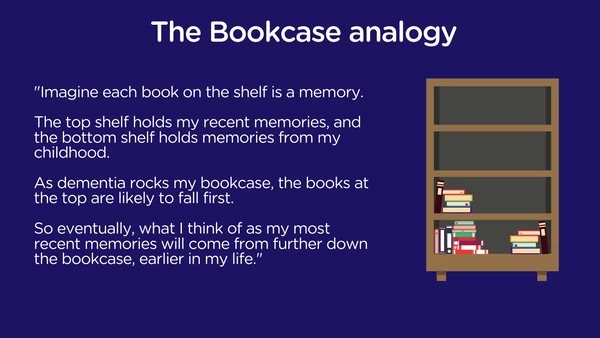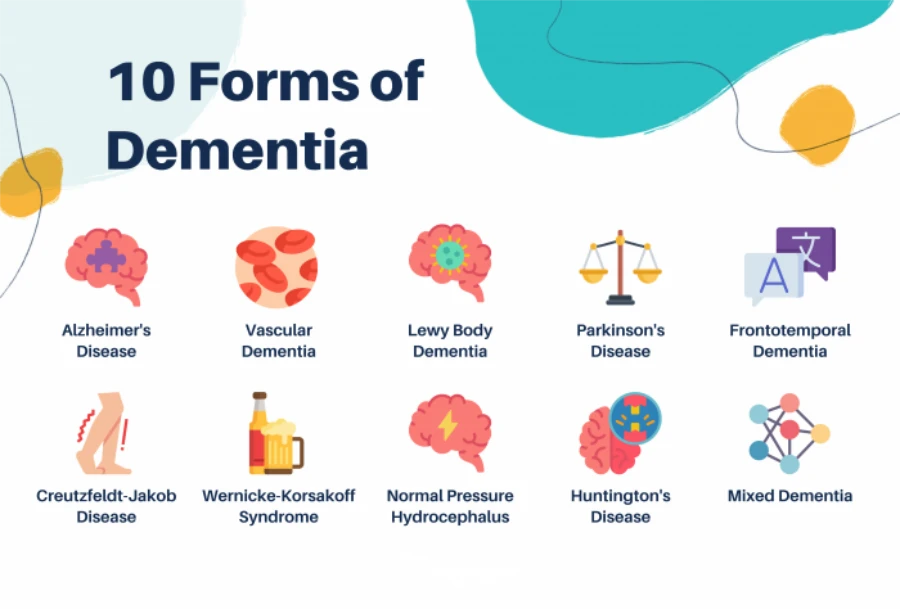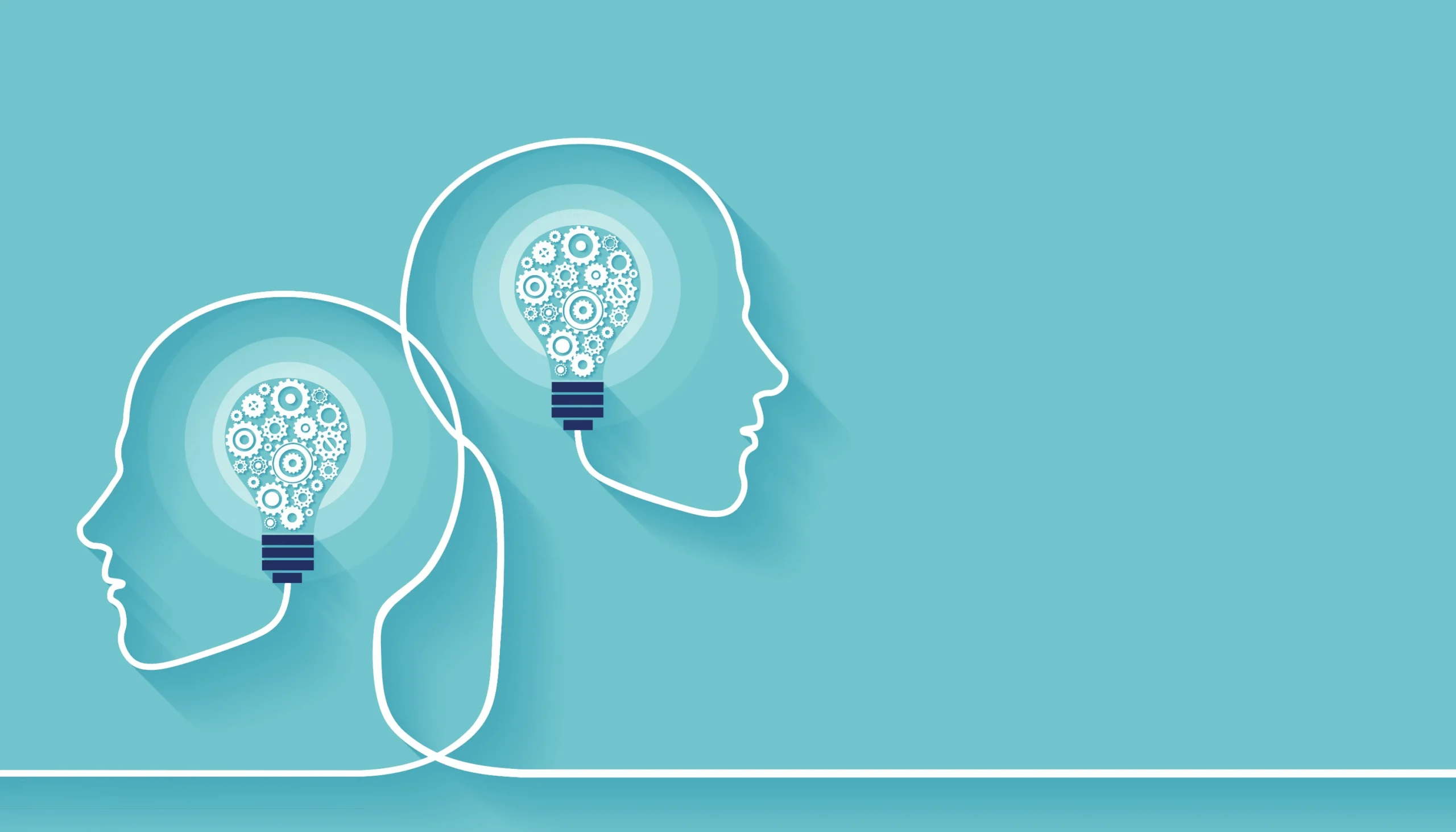Signs of dementia in the elderly is a health condition that concerns memory and thinking impairments due to brain damage and poses unique challenges for those impacted and their caregivers. This guide aims to provide an in-depth understanding of dementia, especially its impact on older adults, thus shedding light on the intricacies of dealing with this condition.
Introduction to Dementia
The term ‘dementia’ is often misunderstood and misused, leading to unnecessary fear and confusion. To understand dementia, it is essential to comprehend that it is not a specific disease. Instead, it is an overarching term that covers many medical conditions, including Alzheimer’s disease, characterised by impaired memory, communication, and thinking abilities.
The “bookcase theory” metaphorically explains dementia. Imagine a bookshelf filled with books, where the topmost books represent the most recent memories. In contrast, the bottom ones denote childhood memories. Dementia acts like a storm hitting the bookshelf, causing the top books (newest memories) to fall off first while the oldest memories stay intact.

What is Dementia?
Dementia is a collective term for symptoms caused by disorders affecting the brain. It is not a specific disease but a broad category of brain diseases that cause long-term and often gradual decreases in the ability to think and remember, significantly impacting a person’s daily functioning. Notably, dementia is more common in people over 65 but can also affect younger people.
Understanding the Impact of Dementia on the Elderly
Dementia profoundly affects the elderly, impacting their standard of living, mental and physical health, and overall well-being. This condition can lead to emotional outbursts, inappropriate behaviour, and wandering, adding caregiver stress. Also, it’s essential to treat elderly dementia patients with utmost respect and care, avoiding any expectation from them or questioning their abilities, which might hurt their feelings.
Signs and Symptoms of Dementia
Early diagnosis of dementia can help manage the symptoms better and slow down the disease’s progression. The signs and symptoms of dementia may vary significantly. Still, at least two of the following core mental functions should dramatically be impaired to be considered dementia:
Memory Loss
One of the most common signs of dementia is memory loss, especially forgetting recently learned information. Other memory changes include:
- Forgetting important dates or events.
- Asking for the same information repeatedly.
- Increasingly relying on memory aids or family members for things they used to handle independently.
Difficulty with Language and Communication
People with dementia often forget simple words or substitute incorrect words, making their sentences challenging to understand. They may also need help understanding others.
Changes in Mood and Behavior
One of the most common effects of dementia is a shift in mood. A person with dementia may suddenly become confused, depressed, fearful, or anxious. They may also become irritable, easily upset, or unusually emotional.
Decreased Cognitive Abilities
Individuals with dementia may experience a decline in cognitive abilities, such as problem-solving, attention, and decision-making. This can make it challenging for them to perform routine tasks like paying bills, preparing meals, or getting dressed.

Types of Dementia
There are several types of dementia, each with unique symptoms and progression patterns. Here are some of the most common types:
Alzheimer’s Disease
This is the most common type of dementia, accounting for 60-80% of cases. Alzheimer’s disease involves parts of the brain that control thought, memory, and language, leading to severe memory loss, confusion, and difficulty communicating.
This is the second most common type of dementia due to damage to the vessels that supply blood to your brain. Symptoms can include disorientation, difficulty speaking or understanding speech, and vision loss.
Lewy body dementia is characterised by protein deposits in nerve cells interrupting brain function, including memory, behaviour, and personality. Symptoms can include visual hallucinations, movement disorders, and poor regulation of body functions.
Frontotemporal Dementia
This includes a range of conditions caused by progressive nerve cell loss in the brain’s frontal lobes (the areas behind your forehead) or temporal lobes (the areas behind your ears). These changes can cause alterations in personality and behaviour, difficulty with language and motor skills, and a lack of awareness of these changes.

Diagnosing Dementia
Diagnosing dementia is often difficult, particularly in the early stages. The initial diagnosis of dementia can be made based on a doctor’s judgment about a patient’s history, symptoms, and clinical examination.
Recognising the Signs and Seeking Medical Help
Suppose you or a loved one has memory problems or other dementia symptoms. In that case, seeking medical help as soon as possible is essential for an accurate diagnosis and appropriate treatment. Early diagnosis allows for better planning and preparation for the future, and treatment may slow the progression of the disease and improve the quality of life.
Medical Tests and Assessments for Dementia Diagnosis
Diagnosing dementia may include a physical examination, a detailed patient history, and cognitive and neuropsychological tests to assess memory, problem-solving abilities, and language skills. Additional tests such as brain imaging (MRI or CT scans) or blood tests may be conducted to rule out other possible causes of cognitive impairment.
Treatment and Care for Dementia Patients
While there is no cure for dementia, various treatment options and care strategies can help manage the symptoms and improve patients’ overall quality of life. Here are some approaches commonly used:
Medications for Symptom Management
Several medications can help manage the symptoms of dementia, particularly in the early stages. These medications boost certain chemicals in the brain involved in memory and cognition. It is essential to consult a healthcare professional to determine the most appropriate drug and dosage for each individual.
Non-Pharmacological Approaches
In addition to medication, non-pharmacological approaches can be crucial in dementia management. These include cognitive stimulation therapy, reminiscence therapy, art and music therapy, physical exercise, and social engagement. These activities can help improve cognitive function, reduce agitation, and enhance overall well-being.
Home Care for Dementia Patients
Caring for someone with dementia at home requires careful planning and an understanding of the condition’s unique challenges. Vital aspects of home care for dementia patients include creating a safe and supportive environment, establishing routines, providing personal care assistance, and ensuring proper nutrition and hydration.
Support for Caregivers
Caring for a person with dementia can be physically and emotionally challenging. Caregivers often face high levels of stress, depression, and burnout. Caregivers must prioritise self-care and seek support from other family members, support groups, or professional counselling services. Understanding the role of caregivers and implementing coping strategies can go a long way in ensuring their well-being.
The Role of Caregivers in Dementia Care
Caregivers play a vital role in managing the daily needs of individuals with dementia, providing emotional support, and maintaining their overall well-being. They often face unique challenges like memory loss, communication difficulties, and behavioural changes. Recognising and acknowledging the importance of their role is crucial in providing them with the necessary support.
Coping Strategies for Caregivers
Managing the care of a person with dementia requires resilience and adaptive strategies. Some essential coping strategies include seeking respite care, practising self-care activities, finding support from other caregivers, and maintaining open communication with healthcare professionals. These strategies can help caregivers navigate the challenges and maintain their well-being.
Finding Support and Resources for Caregivers
Various organisations and resources are available to support caregivers of individuals with dementia. These include local support groups, online forums, educational workshops, and helplines. Connecting with others who are going through similar experiences can provide valuable guidance, empathy, and emotional support.
Managing Dementia-related Challenges
Dementia presents unique challenges requiring specialised approaches to ensure the well-being of individuals with dementia and their caregivers. Here are some common challenges and strategies to address them:
Dealing with Memory Loss
Memory loss is a hallmark symptom of dementia, and it can be frustrating for both patients and caregivers. Memory aids such as calendars, reminder apps, and labelled objects can help individuals with dementia remember important information and daily tasks.
Communicating with Someone with Dementia
Effective communication is essential when interacting with someone with dementia. Using simple language, speaking slowly, maintaining eye contact, and allowing extra time to process information can improve communication and reduce frustration.
Managing Agitation and Aggression
Agitation and aggression are common behavioural symptoms in individuals with dementia. Creating a calm and structured environment, identifying triggers, redirecting attention, and using soothing techniques such as music or gentle touch can help manage these challenging behaviours.
Addressing Wandering Behavior
Wandering is a common concern among individuals with dementia, posing safety risks. Preventive measures such as installing door alarms, using GPS tracking devices, and establishing a routine can help reduce wandering behaviour and ensure the individual’s safety.
Planning for the Future
As dementia progresses, planning for the future and making decisions regarding legal, financial, and healthcare matters is crucial. Here are some key considerations:
Legal and Financial Considerations for Dementia Patients
Legal and financial planning is essential to ensure that the wishes and best interests of individuals with dementia are respected. This includes creating advance directives, appointing a power of attorney, and establishing guardianship if necessary. Consultation with an elder law attorney can guide you in navigating these complex matters.
Advance Care Planning and End-of-Life Decisions
Advance care planning involves documenting an individual’s medical treatment and end-of-life care preferences. It is crucial to discuss wishes regarding life-sustaining treatments, resuscitation, and palliative care to ensure that the person’s values and choices are respected as the disease progresses.
Creating a Dementia-friendly Home Environment
Adapting the home environment to accommodate the specific needs of individuals with dementia can significantly enhance their safety and well-being. Here are some key considerations:
Adapting the Home for Safety and Accessibility
Removing tripping hazards, installing handrails and grab bars, improving lighting, and using contrasting colours can help prevent falls and accidents in the home. It is also essential to ensure the house’s layout is clear and easy to navigate.
Designing a Dementia-friendly Bedroom
The bedroom should be a comfortable and calming space for individuals with dementia. Simple and familiar furnishings, soft lighting, and soothing colours can create a relaxing atmosphere. Ensuring the bedroom is free from clutter and distractions is also essential.
Utilising Memory Aids and Reminders
Memory aids such as calendars, clocks, and labelled drawers can help individuals with dementia remember daily routines and tasks. Visual cues and prompts can also help guide individuals through daily activities.
Conclusion
Dementia is a complex and challenging condition that affects millions of individuals worldwide. Understanding its impact on the elderly is crucial for providing appropriate care and support. By recognising the signs and symptoms, diagnosing the condition, implementing effective treatment and care strategies, supporting caregivers, and creating a dementia-friendly environment, we can improve the quality of life for individuals with dementia and their families.
Click here for more information on our Dementia Care Services, or contact our care team at 0115 648 6630 for further help and advice.




1 thought on “Signs of Dementia in the Elderly: A Comprehensive Guide”
The Alzheimer’s Research Center of Albany, led by Alzheimer’s Doctor Richard F. Holub, provides comprehensive services including Alzheimer’s research, clinical trials, and memory disorder treatment in Albany, NY. Rest assured, we are dedicated to supporting you in your journey.